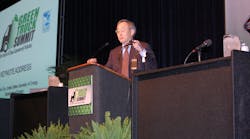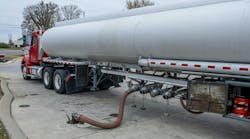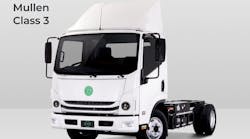INDIANAPOLIS – Alternative fuels are going to become necessary for the U.S. transportation industry, and especially for trucking, as the cost of petroleum alongside the risks posed by climate change will demand shifts in vehicle design strategies, noted Energy Secretary Steven Chu in a speech here before the 2012 National Truck Equipment Assn.(NTEA) annual convention.
“The prices of gasoline and diesel fuels are directly related to the price of oil – and over the last decade global production of oil has been quite flat,” he said.
On top of that, the risks of climate change are growing – though Chu stressed that the climate shifts now occurring are not fully understood. “For example, the number of severe rainstorms and global sea levels are increasing faster than predicted by the climate change models,” he said. “So we need to take control of our energy future to avoid being at the mercy of global oil markets, as well as mitigate the risks of climate change.”
To that end, Chu said the Dept. of Energy(DOE) is shifting its focus to more transportation research investments, with an eye to getting a range of vehicle improvements “into the hands of the private sector as quickly as possible.”
He added that, “we [the DOE] decided quite candidly that our dollars were disproportionate, and that we needed to invest more in transportation and less on stationary [energy] sources” to gain improvements in energy consumption.
To that end, DOE is funding efforts to reduce the cost of compressed natural gas (CNG) fuel cylinders from the approximate $5,000 price tag of today to help lower the cost footprint of this vehicular fuel. The agency is also funding efforts to reduce the kilowatt/hour (kw/hr) cost of batteries for electric vehicles, working with a company that has developed a new battery prototype that cost $300 per kw/hr versus the $600 to $700 kw/hr of current battery technology.
“Our goal is to get to $125 per kw/hr by the end of the century and we’re almost halfway there already,” Chu said.
See video from Chu at NTEA on investing in transportation
More video from Chu on energy diversification
Another tactic being deployed is to bring more super-computing power to OEMs, in order to help cut new vehicle and engine design costs by 50%. “So with 50% fewer prototypes and 50% fewer mistakes, we can significantly reduce the final cost of new truck technology,” he explained.
He also stressed that DOE is not trying to “set the record for the world’s most expensive truck” by pursuing alternative fuels and a variety of aerodynamic and engine design changes to heavy trucks.
“Our goal is that whatever new technologies we develop and whatever additional cost must pay for itself over four or five years” of the truck’s operating life, he stressed. “We also believe private sector competition will be fundamental to achieving this so we’re increasing partnerships [with private companies] as a result.”



